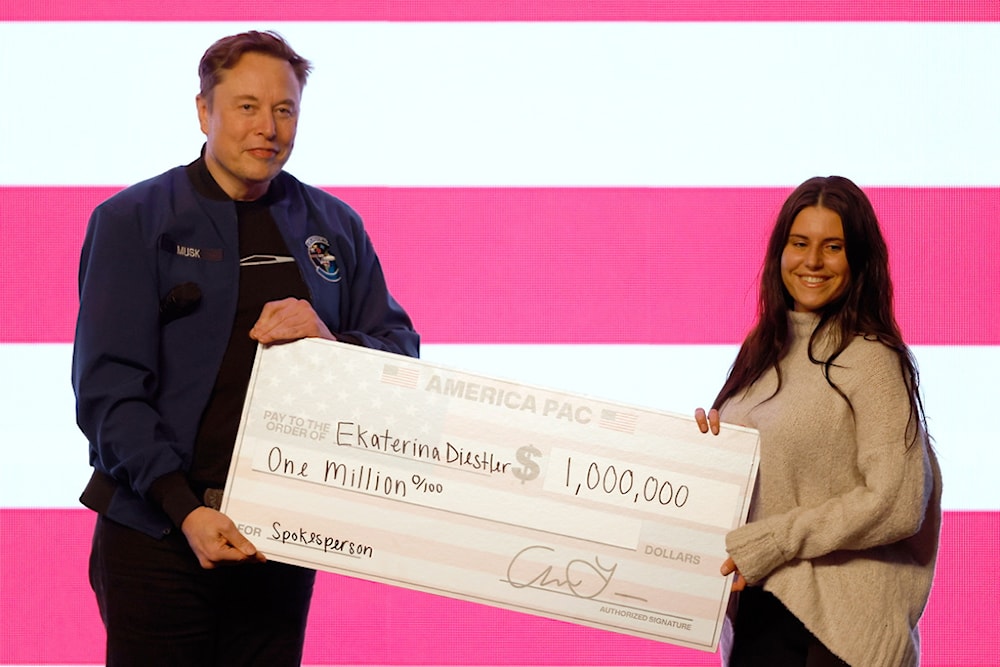Musk gives $1mln to voters after Wisconsin Court blocks challenge
Wisconsin’s Supreme Court unanimously declined to hear a last-minute attempt by the state's Democratic attorney general, Josh Kaul, to prevent Musk from distributing the checks.
-
 Elon Musk presents a check for $1 million during a town hall Sunday, March 30, 2025, in Green Bay, Wis (AP)
Elon Musk presents a check for $1 million during a town hall Sunday, March 30, 2025, in Green Bay, Wis (AP)
Elon Musk distributed $1 million checks to two Wisconsin voters on Sunday, appointing them as spokespeople for his political group ahead of a crucial Wisconsin Supreme Court election.
The tech billionaire, a top advisor to US President Donald Trump, framed the race as vital to Trump's agenda and "the future of civilization."
Trump has appointed Musk to lead an unprecedented initiative to drastically reduce the federal government, resulting in the closure of multiple agencies and the dismissal of tens of thousands of employees.
Addressing a crowd of around 2,000 in Green Bay, Musk emphasized the significance of the election. "It’s a super big deal," he declared. "I’m not phoning it in. I’m here in person."
Musk and affiliated groups have invested over $20 million to support conservative candidate Brad Schimel in Tuesday’s election, which will shape the ideological balance of a court set to rule on key issues in the battleground state. His involvement has become a focal point of the race, with liberal candidate Susan Crawford and her allies criticizing Musk’s financial influence on the court.
"I think this will be important for the future of civilization," Musk stated. "It’s that significant."
He highlighted the court’s potential role in congressional redistricting, which he argued could impact control of the US House.
"If the (Wisconsin) Supreme Court is able to redraw the districts, they will gerrymander the district and deprive Wisconsin of two seats on the Republican side,” he warned, adding that such changes could block government reforms benefiting "the American people."
"We actually are in serious danger of losing the election," he said. "We've got to pull a rabbit out of a hat."
On Sunday, Wisconsin’s Supreme Court unanimously declined to hear a last-minute attempt by the state's Democratic attorney general, Josh Kaul, to prevent Musk from distributing the checks.
The ruling, which came minutes before Musk’s rally, followed similar rejections by two lower courts. Kaul argued that Musk’s actions violated state law prohibiting inducements to vote.
Musk’s attorneys countered that the payments were an exercise of free speech meant to "generate a grassroots movement in opposition to activist judges," rather than explicitly advocate for a specific candidate. They contended that restricting Musk’s actions would violate both the Wisconsin and the US constitutions.
Musk’s political action committee used a similar strategy ahead of last year’s presidential election, offering $1 million per day to voters in Wisconsin and six other battleground states who signed a petition supporting the First and Second Amendments. A Pennsylvania judge ruled that prosecutors had failed to prove the effort constituted an illegal lottery, allowing it to continue through Election Day.
The Wisconsin Supreme Court currently has a 4-3 liberal majority, with all four liberal justices endorsing Democratic-backed candidate Susan Crawford.
Hours before the rally, Musk’s attorneys requested the recusal of two liberal justices—Jill Karofsky and Rebecca Dallet—who had campaigned for Crawford, arguing their involvement created "the specter of inappropriate bias." Both justices refused and stated they would explain their reasoning later.
Meanwhile, one of the court’s conservative justices has endorsed Schimel, who wore a "Make America Great Again" hat at a campaign event on Sunday.
In a national TV interview, Schimel denied coordinating with outside groups, including Musk, stating that Trump had only asked if he would "reject activist judges" and uphold the law.
The election has shattered records for judicial race spending, surpassing $81 million.
The Wisconsin Supreme Court is expected to rule on pivotal issues, including abortion rights, congressional redistricting, union power, and voting regulations—decisions that could influence the 2026 midterms and the 2028 presidential race.
Read more: Global protests target Elon Musk, Tesla over US budget cuts

 4 Min Read
4 Min Read








